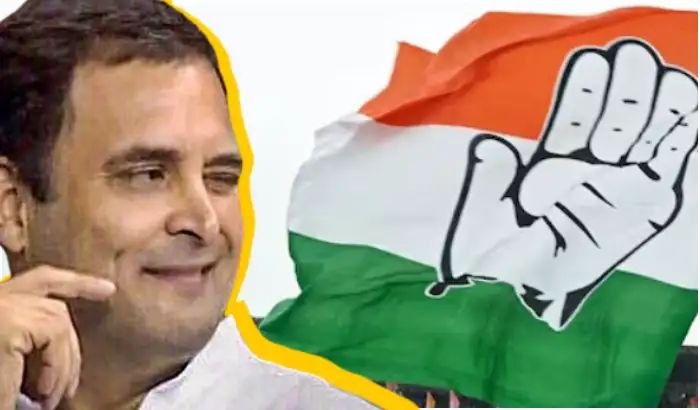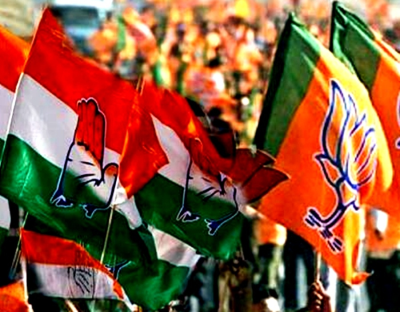Congress leaders, supporters hail Rahul Gandhi for his criticism of Electoral Bonds in 2019: How data shows after his tweet, INC got 1421 crores via bonds

On Friday (15th March), the Congress party leaders and supporters targeted the national ruling party BJP for getting donations through electoral bonds.
This is a day after the Election Commission of India released the data on Electoral Bonds bought by various entities from the State Bank of India and the recipients of such bonds. The Congress supporters and leaders shared an old tweet of Rahul Gandhi in which he had blatantly claimed that Electoral Bonds were the new way of “bribing and commissioning”. The said tweet by Gandhi was posted in the year 2019 two years after the Electoral Bonds were introduced.
The Congress leaders and supporters on 15th March shared the old tweet saying that Gandhi was right when he said that Electoral Bonds were the new way of bribing. The INC supporters also claimed that Gandhi was the new leader that India needed.
“Rahul Gandhi called out Electoral Bonds back then, for what they were – BRIBES & LEGAL COMMISSIONS, which were recently declared unconstitutional by the SC, and now the data has proved him right,” tweeted Congress worker Gaurav Pandhi.
Meanwhile, the INC leader from Tamil Nadu, KTL also said that Gandhi was proven right after five years. “The Electoral Bonds are a new way of commissioning bribes,” he indicated as he hailed Rahul Gandhi.
“As @RahulGandhi ji rightly predicted, #ElectoralBonds has turned out to be one of the biggest scams through which BJP legalized extortion, bribery & money laundering with a brute majority in the house. Now that the data has been released, the BJP stands exposed and has nowhere to hide,” said Bharat Solanki, AICC in-charge Jammu and Kashmir.
Meanwhile, other Congress leaders also hailed Rahul Gandhi for ‘predicting’ and making a statement that the Electoral Bonds were one of the biggest scams through which BJP allegedly “legalized extortion”.
Congress is the third largest beneficiary of Electoral Bonds
In a historic decision on February 15, the Chief Justice Chandrachud-led court ruled that anonymous Electoral Bonds violate the right to knowledge under Article 19(1)(a) of the Constitution.
Not only that, but this constitution bench asked the State Bank of India, the bank that issues Electoral Bonds, to stop issuing them immediately. Furthermore, the bank was required to report information of any such bond purchases made following the court’s interim decision on April 12, 2019, to the Election Commission of India within three weeks, with a deadline of March 6, 2024.
It is important to note here that Congress stands as the third-biggest beneficiary of the Electoral Bonds after BJP and TMC as per the data revealed by the Election Commission of India. The BJP which at present rules several Indian states and is also at the Centre reasonably justifies the benefit it has availed via the electoral bonds. The BJP which rules over 18 Indian states has availed 46% benefit from the total Electoral Bonds from 12 April 2019 to 11 January 2024. However, Congress has been ruling three states in the country, Himachal Pradesh, Karnataka, and Telangana at present, and becoming the third largest beneficiary of the electoral bond scheme raises more suspicion in this case.
party-wise tally of amounts received via Electoral Bonds, image via @LekhakAnurag on X
Rahul Gandhi stated in the year 2019 that in “New” India, bribes & illegal commissions were called Electoral Bonds. That literally means the Congress, as per Rahul Gandhi, has got Rs 1422 crores as ‘bribe and illegal commissions’. The Congress supporters and leaders instead of praising Gandhi need to comment on the ‘bribe money’ received by their party.
What are electoral bonds?
Electoral bonds are a relatively new notion in political fundraising in India. Electoral bonds, which were introduced in 2017, allowed individuals and corporations to anonymously donate an unlimited amount of money to any political party. Until a landmark decision by the Supreme Court in mid-February to abolish the seven-year-old election funding system, just weeks before the Lok Sabha elections in April-May this year, donors purchased bonds in fixed denominations from the State Bank of India (SBI) and handed them over to any political party, which could cash them using a bank account. The bonds did not compel the recipient political parties to disclose the donor’s name to anyone, even to the Election Commission of India (ECI).
According to the Electoral Bond scheme, an Electoral Bond was issued in the form of a promissory note that was bearer in character. According to the Association for Democratic Reforms, a bearer instrument does not bear the name of the buyer or payee, hence no ownership information is recorded, and the holder of the instrument is considered to be the owner.
Concerns over electoral bonds prompted proposals for reforms to increase openness and accountability in political fundraising. Some even have urged tougher rules and disclosures to prevent the misuse of these tools.
How Congress benefitted due to the electoral bond money since 2019
As per the reports, since April 2019, the BJP has raised Rs 6,061 crore through electoral bonds, compared to the Congress’s Rs 1,422 crore. However, significant exceptions transpired when Congress held a better possibility of winning elections.
According to data, the Congress party raised more money than the BJP in January and July 2021. Interestingly, this coincides with assembly elections in states including Tamil Nadu, Puducherry, and Kerala, where the Congress held a firm position.
In January 2021, Congress cashed Rs 7.1 crore against the BJP’s Rs 1.5 crore, while in July 2021, it redeemed bonds for Rs 24.7 crore vs the BJP’s Rs 18 crore. Interestingly, the Congress party’s greatest numbers were reported around October 2023, when it encashed Rs 401.9 crore against the BJP’s Rs 359 crore during the same period.
Chhattisgarh, Rajasthan, Telangana, Madhya Pradesh, and Mizoram were among the states set to hold elections during this time period, where the party was either in power or expected to return.
Congress reported the second biggest encashment within a single phase in April 2023, just before the Karnataka elections, at Rs 190.6 crore. The BJP which was in power in Karnataka then, redeemed Rs 334 crore in the same period but lost the southern state. Another minor period in which the grand old party outperformed the BJP was in July 2022, when it pocketed Rs 57.5 crore compared to the latter’s Rs 12.5 crore.
Latest development in Electoral Bond case
In the latest development, the Supreme Court declared on Friday (March 15) that the State Bank of India (SBI) must publish Electoral Bond numbers in addition to the information it has already disclosed about bond purchase and redemption.
A bench of Chief Justice DY Chandrachud, Justice Sanjiv Khanna, Justice BR Gavai, Justice JB Pardiwala, and Justice Manoj Misra reassembled today to hear an application filed by the Election Commission. In its application, the ECI demanded the return of sealed cover documents provided by the commission to the court in accordance with its interim order.
The Court categorically stated that the State Bank of India (SBI) has to disclose Electoral Bond numbers as well, in addition to the details it has already disclosed regarding the purchase and redemption of the bonds.





